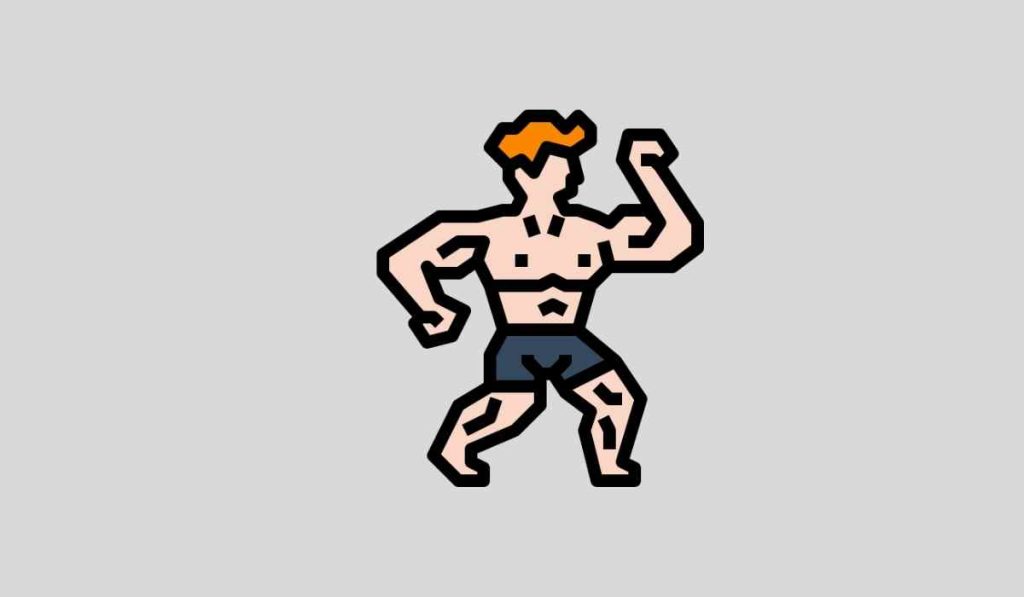People know about keto’s weight loss benefits, but what about muscle gain? Is keto good for muscle building? Here’s what you need to know about building muscle with the ketogenic diet.

The ketogenic diet is one of the most popular diets for weight loss.
The benefits of the keto diet are epic: targeted belly fat burning, decreased hunger cravings, and lighting fat on fire for serious weight loss.
However, there is more to the ketogenic diet than you know. While many believe that it is impossible to gain muscle during a keto diet, it is possible.
Once you understand how certain factors can influence muscle gain (calories, protein, supplements, and exercise), you can unleash the keto diet for muscle-building.
In this article, we will cover it all, from the basics of keto to the right supplements to use.
Let’s get into it.
The Keto Diet – The Basics
The ketogenic diet, commonly known as keto, is a low carb, moderate protein, and high-fat diet.
Its main purpose is to reduce your carb intake to stop supplying your body with glucose. Glucose is the preferred energy source in your body. When its primary energy supply is drastically cut, it needs to form a new energy source.
That is where ketones come into place.
See also: How Long Does it Take to Get Into Ketosis?
Your body starts burning your fat sources to compensate for the lack of glucose1. When a lot of ketones are produced in your body, you are in a ketosis state.
On average, it takes around 2-5 days to enter ketosis. However, several factors might affect how fast you enter this stage (previous carb intake, sleep, stress). Additionally, there are supplements like keto pills that can help you get into ketosis faster.
There are many benefits of doing a keto diet:
- Increases your fullness levels2
- Weight loss3
- Improved bloodwork (triglycerides, glucose, cholesterol)4
- Reduced blood pressure5
- Has brain-protective benefits6
Is Keto a Good Diet for Building Muscle?
Before we talk about how keto can help you build muscle, it’s essential to understand what you need for muscle building.
Three main things are needed to build muscle: sleep, exercise, and diet.
- Sleep. Lack of sleep can influence your gains. During sleep, your muscles recover, and essential hormones (like testosterone) are released. Make sure to get enough sleep (7-9 hours) to recover like a boss so that your body can build muscle.
- Exercise. Your muscle needs stimulus to be able to build muscle mass. Make sure to train hard and the right way.
- Diet. You need a caloric surplus (eating more calories than your body needs) and a good protein intake to gain muscle. Muscle building is a costly process. This means that if your body doesn’t have enough calories to support your basic needs, it won’t expend them on your muscles.
Knowing that, what does the research say about gaining muscle on keto?

A study on 25 college students compared the results obtained on either a keto or a Western diet for 12 weeks7.
While those on a Western diet saw a more significant muscle increase (4%), those on a keto diet still saw great muscle improvement (2%). However, one benefit was that those on the ketogenic diet saw a more significant fat loss (2.2 kg) than those on a Western diet (1.2 kg).
In summary, those on keto had a lower muscle increase but a more significant fat loss than people following a Western diet.
One of the concerns regarding keto and muscle building is that it might affect performance. While this might be true during the first couple of days (keto flu), your body learns to adapt to using ketones for energy.
Once your body adapts to using ketones, research shows no decrease in performance compared to those with a high carb intake8.
How to Maximize the Keto Diet for Muscle Growth
The following recommendations help you build muscle mass while following a ketogenic diet:
? Caloric Intake
As mentioned before, you need to consume more calories than your body needs to gain muscle9.
The amount of calories you need depends on your weight, age, height, exercise (duration, frequency, and intensity), and daily movement.
First, determine your maintenance calories (how many calories you need to maintain weight), and then add 10-20% extra calories to reach a caloric surplus10.
This means that if your maintenance calories are 2,000 kcal. You should be consuming 2,200 to 2,400 kcal per day.
Adjust your calories each month according to your results or if there are any other changes (for example, your exercise).
? Protein Intake
Protein is the most important nutrient for muscle building since it’s in charge of repairing and growing your muscles.
Your protein requirements are typically related to your body weight.

It is recommended to consume 1.6 to 2.0 grams of protein per kilogram of body weight11.
Make sure not to consume more than 2.0 grams per kilogram of body weight since protein can be transformed into glucose (gluconeogenesis), affecting your ketosis12.
Include protein sources like eggs, chicken, fish, meat, Greek yogurt, or protein shakes.
The timing when consuming protein also plays a crucial role in your muscle gains. Ensure a protein source in every meal (hopefully every 2-3 hours).
Pay extra attention to adding a protein source after your workout.
? Track Your Carbs and Fats
Traditionally, it was thought that you need carbs to build muscle.
However, now we know they don’t need to be included in the equation to gain some muscle.
To stay in ketosis, make sure you are eating below 50 grams of carbs per day. If you are going to include high-carb food (like fruit), make sure to have it around your workout for the best recovery and performance.
Since carbs are reduced, your primary energy source comes from fats.
Monitor your fat consumption to ensure you are reaching your total fat intake and thus your daily calories (remember, without enough calories, muscle building doesn’t happen).
Tracking and planning your macros is crucial when doing the ketogenic diet. Keto apps and meal planners can help you plan for success and ensure that you are ingesting enough protein for muscle recovery and muscle growth.
Include healthy fats like avocado, nuts, seeds, olives, olive oil, and coconut oil. Since they are very energy-dense (they have a lot of calories in little food), they can help you achieve that caloric surplus.
For example, you get the same calories in two teaspoons of olive oil as you would in one slice of bread (80-90 kcal).
Additionally, fat sources like chia seeds, flax seeds, and salmon (both protein and fat) are high in omega-3 fatty acids. They help reduce inflammation in the body leading to better recovery.
In the end, optimal recovery (like having a good night’s sleep) helps your muscles have an optimal environment for muscle growth.
? Consider Supplementation
Finally, if you want to give your body an extra boost, you might consider adding certain supplements.
See also: 7 Best Supplements for Getting into Keto Faster
Here are some supplements you might want to consider to help you make those gains easier.
- Protein supplement. If you cannot achieve your daily protein intake, you can opt for a protein supplement. Make sure it’s keto-friendly with the least carbs possible (no more than 3 grams).
- Creatine. Creatine helps you produce energy, allowing you to have more fast-acting energy. This results in you being able to lift heavier and stronger. More power means more muscle rupture, leading to muscle gain.
- Caffeine. Caffeine is your friend if you are tired and do not have enough energy for your training session. This supplement can help you reduce your fatigue, allowing you to give your 100% at the gym.
- MCT oil. MCT oil gives you fast-acting energy, making it the ideal pre-workout supplement. Additionally, it can increase your energy intake, making it easier to reach your caloric intake.
Building Muscle on Keto – FAQs
Is creatine okay on keto?
Creatine is an excellent supplement to add while doing keto focused on muscle growth. It helps increase your ATP (energy), which means you have more power and force. This helps improve your performance leading to muscle rupture (AKA muscle growth).
Since it has no carbs, it won’t affect your ketosis state.
Is it harder to gain muscle on keto?
One of the benefits of keto is that due to the large consumption of fat.
Since you need a caloric surplus, reaching your high caloric intake might be tricky. It might be more challenging for some people to gain muscle on a keto diet.
As long as you reach your caloric intake, you can gain muscle during keto.
The Bottom Line
While the ketogenic diet is known for its weight loss properties, your muscles don’t need to suffer. You can still achieve some gains.
It might be challenging for some due to its hunger-lowering effect, making it more difficult to reach your caloric intake.
However, as long as you have a caloric surplus (more calories than your body needs), adequate protein intake, controlled carbs, good sleep, and regular exercise, you can increase your muscle mass on keto.
More Keto Guides and Resources
6 Best Keto Cookbooks for Mastering the Ketogenic Diet. The right keto cookbook can give you clarity and the recipes to keep your tastebuds happy and your weight loss goals on track. Here’s a review of the best keto cookbooks on shelves right now.
Keto Charge – A Keto Pill That Actually Works (Full Review). Curious if Keto Charge can help you get into ketosis faster and achieve your weight loss goals? Read on for a full review, including key features, and see if it’s right for you.
How Much Water Should I Drink on the Keto Diet? Staying properly hydrated helps you stay in ketosis and speeds up fat breakdown. Here’s a detailed look at how much water you should drink on the keto diet.